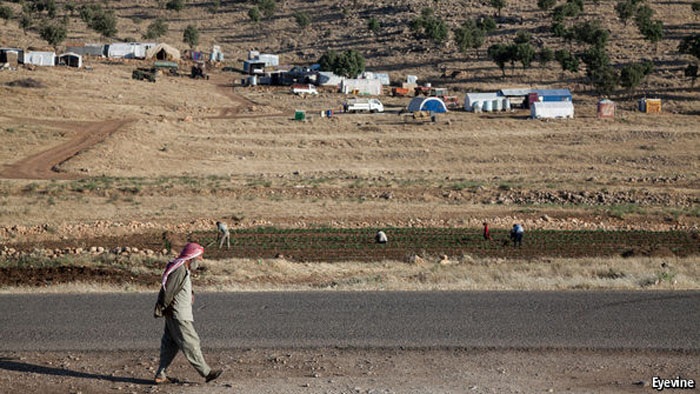FROM afar, Mount Sinjar rises out of Iraq’s caked-earth flats like a giant upturned tureen. Up close, its crevices offer glimpses of lush tobacco plantations, and the homes of Yazidis lurking within. So formidable are its rugged defences that it has defeated the many foes who for centuries have sought to stamp out the ancient peacock-worshipping sect. Even the most recent and cruel, Islamic State (IS), which massacred and enslaved Yazidi communities on the plains with abandon, gave up the effort once it reached its foothills.
The mountain’s plateau today is coated with tents, sheltering the fortunate thousands who fled for its passes before the jihadists swept through in August 2014 and hunted the others down. Reluctant to entrust their fate to outsiders, they have set up their own administrative council in a caravan, as well as an armed force, the Sinjar Resistance Units, numbering 1,000 men. The multi-faith settlements Saddam Hussein fashioned on the plains below in the 1970s seem a historical relic. Today, says the council chief, Khidr Salih, Iraq’s half million Yazidis need their own enclave and homeland; the region has now fallen to the Kurds.
In Mr Salih’s telling, the Yazidis’ new Kurdish overlords are little better than Arab ones. If the latter perpetrated genocide, the former, he says, let it happen by fleeing without a word in the night as IS approached. “We want international forces,” reads the graffiti on a roadside, indicating the local distrust.
Those are unlikely to come any time soon. Kurdish forces control Fishkhabour, the gateway to Sinjar on the banks of the Tigris River 60 miles (100km) to the north, and access depends on permits. This correspondent was granted permission, but other foreign aid workers and journalists complain they are turned back.
None of Iraq’s warring communities has done more to rescue Yazidis than the Kurds. Whereas other Muslims shunned them as devil-worshippers (the revered Yazidi peacock, Melek Taus, represents a fallen angel associated with Satan), Kurdish fighters opened a corridor to Sinjar after IS took control of the plains. Kurdish leaders, who pride themselves on their religious tolerance, readily accommodated legions of the displaced in vast camps. Though Sunni, they created a department of Yazidi affairs in the religious ministry of the autonomous Kurdistan Regional Government. Their prime minister, Nechirvan Barzani, ordered the renovation of the Yazidis’ second holiest shrine. The Kurds launched a commission to investigate and highlight crimes of genocide, and uncover mass graves—31 at the latest count.
But as is often the way of the Middle East, in their quest to mark out their identity, liberation movements are prone to suppressing similar stirrings in others. Kurdish officials have submerged the predominantly Kurdish-speaking Yazidis into a broader Kurdish collective. Though the Kurds, with American help from the air, almost entirely recaptured Sinjar from IS by the end of 2015, Mr Barzani’s government is seeking to postpone a mass return “until after Mosul falls,” says his spokesman. “Realistically, the Yazidis are not going home for a long time,” says an official at Mamilyan camp, which hosts 13,000 displaced people deep in Kurdistan’s hills, 170 miles (270km) east of Sinjar.
Fearful that another resettlement programme looms, Sinjar’s Yazidi leaders liken a programme of “Kurdification” to Saddam Hussein’s Arabisation in the 1970s. “We’re neither Kurds nor Arabs,” insists Mr Salih, Sinjar’s fledgling council leader. His efforts to encourage a mass return are dogged by a lack of services. Mr Barzani, the ruler of Iraqi Kurdistan, has yet to reconnect Sinjar and its surrounding settlement to the main electricity grid or water mains, and has shunted responsibility for financing schooling and reconstruction onto Baghdad. And having failed to protect the Yazidis in 2014, his officials say they do not want to make the same mistake twice. “It’s not safe enough for a mass return,” explains his security chief at Sinouni, who in calmer times was a veterinarian.
Security can also seem wanting in Kurdistan’s camps for the Yazidis. At Mamilyan, camp managers offer joint baking classes in an attempt to break down barriers between Yazidis and displaced Sunni Muslims from Mosul, whose tribes many Yazidis blame for perpetrating the genocide. “We make sure everyone washes their hands at the start,” says an aid worker, hoping to combat Muslim taboos on eating with devil-worshippers. But the tents are said to conceal weapons. And when a Sunni imam uttered the traditional call to prayer seeking protection from Satan, Yazidis took offence, and violence quickly followed. Armed Kurdish Muslims from outside the camp rushed to help Muslims within. “The [Sunnis] don’t recognise what we’ve been through. They still think we’re infidels,” says a young camp resident. “We’re desperate to go back to Sinjar.”







Comments